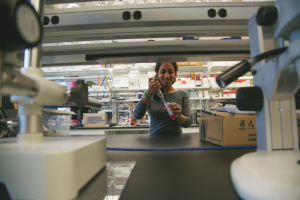The University of Houston Cullen College of Engineering’s bachelor’s degree program in biomedical engineering has been accredited by the Engineering Accreditation Commission of ABET, the global accreditor of college and university programs in applied science, computing, engineering, and engineering technology. All of the UH Cullen College of Engineering’s undergraduate programs are ABET accredited.
ABET accreditation assures that programs meet standards to produce graduates ready to enter critical technical fields that are leading the way in innovation and emerging technologies, and anticipating the welfare and safety needs of the public.
The bachelor’s degree option in biomedical engineering was launched in 2003 in response to the tremendous growth of the biomedical engineering field and associated industries. In five short years, the freshman enrollment climbed from 12 to 51 in 2008. That same year, the Texas Higher Education Coordinating Board approved the establishment of the department of biomedical engineering as the sixth engineering department at the Cullen College.
Joseph W. Tedesco, Elizabeth D. Rockwell Dean of the Cullen College of Engineering, said that the biomedical engineering program was established to help meet the growing demand for qualified graduates in the field across the city of Houston and the world.
“Biomedical engineering is one of the fastest growing disciplines in engineering, and the city of Houston is home to the largest medical center in the world,” Tedesco said. “As Houston’s University, we have a responsibility to ensure that the Cullen College is graduating a growing number of highly-skilled, world-class biomedical engineers into the local economy each year.”
Increasing enrollment would help to generate a talented pool of graduates expected to help staff the biomedical engineering field, which will see faster than average job growth in coming years. Employment of biomedical engineers is projected to grow 27 percent between 2012 and 2022, according to the U.S. Bureau of Labor Statistics. The federal agency attributes the rise in demand for biomedical engineers to the aging population and the need for more sophisticated medical equipment and procedures.
Metin Akay, an internationally known researcher and educator, was named the founding chair of the biomedical engineering department at UH in 2009. Akay carries the title of John S. Dunn Chair in Biomedical Imaging Sciences. The endowed chair position, funded by the John S. Dunn Research Foundation, was created to help lead research initiatives at the university and play a prominent role in the Institute for Biomedical Imaging Science—the research partnership formed by UH, The Methodist Hospital and Weill Cornell Medical College.
The biomedical engineering department at UH now has 23 full-time faculty members and nearly 280 total students. The curriculum was shaped with input from leading industry professionals, including Akay himself, an accomplished researcher and central figure in the biomedical engineering community.
In building the Cullen College’s biomedical engineering program, Akay used his deep understanding of the field to answer two big questions: what kind of culture should the department have and where should it focus its research efforts.
“A unique culture was built with the active and collegial participation of the faculty, staff, students and industrial advisory board members. We know every undergraduate student in person and by name, and care about all of them,” Akay said.
On the research front, Akay naturally selected the areas where he saw the biggest opportunities – those where scientific and technological advances meet growing patient populations. As such, the main thrust areas in the biomedical engineering curriculum are neural and rehabilitation engineering, biomedical imaging, and bionanoscience.
Graduates of the biomedical engineering bachelor’s program are prepared for careers in the biomedical technology industry, graduate school or professional programs such as engineering, medicine, business and law.
Sought worldwide, ABET’s voluntary peer-review process is highly respected because it adds critical value to academic programs in the technical disciplines, where quality, precision, and safety are of the utmost importance.
Developed by technical professionals from ABET’s member societies, ABET criteria focus on what students experience and learn. ABET accreditation reviews look at program curricula, faculty, facilities, and institutional support and are conducted by teams of highly skilled professionals from industry, academia, and government, with expertise in the ABET disciplines.
ABET is a nonprofit, non-governmental organization recognized by the Council for Higher Education Accreditation (CHEA). It currently accredits almost 3,500 programs at nearly 700 colleges and universities in 28 countries.
To learn more about the biomedical engineering undergraduate program at the UH Cullen College of Engineering, please visit www.bme.uh.edu/undergraduate.
More information about ABET, its member societies, and the accreditation criteria used to evaluate programs can be found at www.abet.org.
